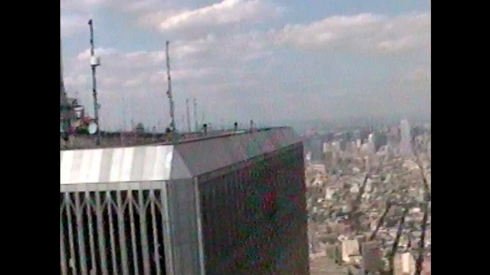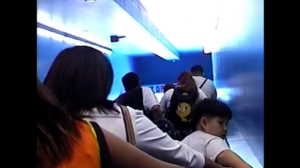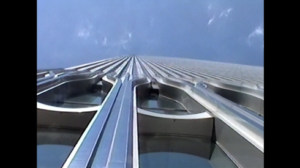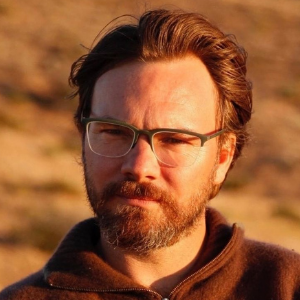FIRST PERSON: Coming of age in the 9/11 era (with video)
City Times multimedia journalist Philip Salata reflects on his August 2001 trip to the Twin Towers

Philip Salata, then 14, shot video of the view from the observation deck on the South Tower toward the North Tower of the World Trade Center on Aug. 30, 2001. Philip Salata screenshot
September 10, 2021
Viewer discretion is advised, as some of the images in the video depict visuals that 11 days later became a part of the memory of the tragic attack on the World Trade Center.
“Top of the world!”
Family friend Carol Ellis said these words into the camcorder as my 14-year old hand shook while I panned from her close-up to the view from floor 107 of the South Tower of the World Trade Center.
Cut to an even more uncomfortable close-up — I turned the camcorder into my face.
“These are Philip’s eyes on top of the world.”
It was Aug. 30, 2001.
Eleven days after, back in San Diego, I awoke to Ellis’ telephone call and rushed to turn on the television. I watched the second plane hit the South Tower live.
When the towers finally collapsed, I saw myself suspended in the air.

In that family vacation video we can see pre-9/11 faces onto which, in retrospect, I project a kind of innocence. It is not theirs though, rather it was mine as a teenager coming of age during what soon came to be understood nationally as an era-marking event.
Yet I gradually came to understand that this was not the first occurrence of domestic terrorism in the United States.
Later that evening, as we traversed a bustling Times Square, my father took the camera. We can hear Ellis asking what he is filming.
“People’s faces,” he said.
Just a few months before that, March 5, 2001, my high school was in lockdown as students suddenly became victims and witnesses of a mass shooting at neighboring Santana High. It was local news that went national.
I remember the image of the perpetrator’s face and remembered it again and again in the following years as more young men took to weapons and killed innocent schoolmates.
When the towers were struck we arrived at school to a similar lockdown. The events of months before felt suddenly like training.

After 9/11, what was already a historically fraught attitude toward non-nationals, became again more complicated.
Growing up on the U.S.-Mexico border with a family of Polish immigrants, the notion of “otherness” always invoked in me a necessary reckoning.
Yet my family was welcomed under an immigration policy that saw particular geopolitical advantage by letting in immigrants from the Eastern bloc.
As I became more aware of whom I was sharing this city with, I realized that finding affinity through the identity of being a first-generation Californian was more complicated. To start, there were race, class, gender, and religion to take into consideration. The differences in experience became vital to distinguish.
Where NAFTA impacted the people and economy of the border regions, now the Department of Homeland Security amplified the militarization of the ports of entry and airports.
The meaning of the word “nation” became ever more difficult to understand as I became more privy to the violence that occurred on this continent in the name of nation-building.
As the 20-year anniversary of 9/11 sees the declaration of the end of the war in Afghanistan we are reckoning with the aftermath of yet another era.
As the pullout drew to a close President Joe Biden said, “to be able to take on al-Qaeda … we decided to engage in nation-building …
That never made any sense to me.”
That never made sense to me either.












